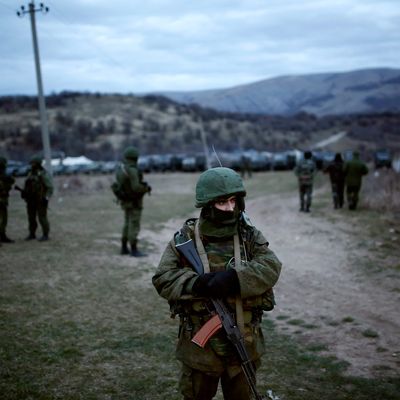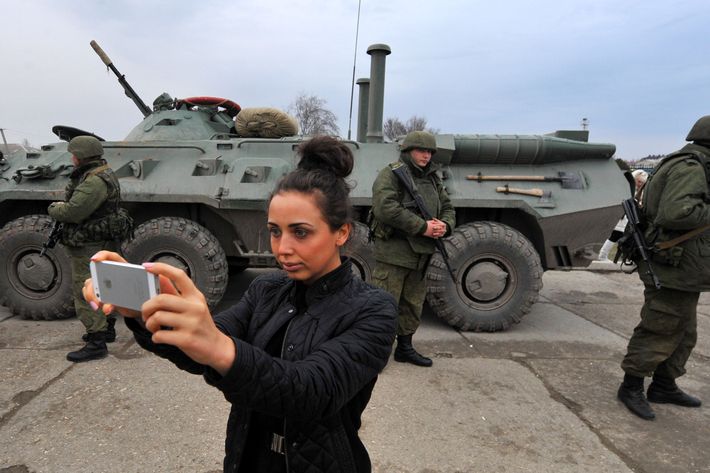
With Russia tightening its grip in the Ukrainian territory of Crimea, Barack Obama is facing what some diplomatic veterans are calling “the most important, most difficult foreign-policy test of his presidency.” As such, while Vladimir Putin flexes his muscles in the Black Sea, there is no shortage of suggestions for what Obama should — or needs to — be doing to show the world who’s boss. So far, he’s sent Secretary of State John Kerry to Kiev and aims to “make it hurt” for Russia politically and economically, but it’s never enough for the armchair commanders-in-chief. The president, in the words of the New York Times, has been “besieged by advice to take more assertive action.”
“Create a democratic noose around Putin’s Russia,” urged Senator Lindsey Graham, Republican of South Carolina. “Revisit the missile defense shield,” suggested Senator Marco Rubio, Republican of Florida. “Cancel Sochi,” argued Representative Mike Rogers, the Michigan Republican who leads the Intelligence Committee, referring to the Group of 8 summit meeting to be hosted by President Vladimir V. Putin. Kick “him out of the G-8” altogether, said Senator Richard J. Durbin of Illinois, the Democratic whip.
Everyone has a plan, but none has been louder than the GOP. Senator Graham, appearing on CNN Sunday, offered, “President Obama needs to do something”:
How about this, suspend Russian membership in the G-8 and the G-20 at least for a year starting right now. And for every day they stay in Crimea, add to the suspension. […]
I would fly the NATO flag as strongly as I could around Putin. I would suspend his membership in the G-8, be the G-7. The G-20 would become the G-19 at least for a year. And every day he stays in the Ukraine, I would add to it.
John McCain would like Obama to be “braver,” Time reports:
On the military front, McCain believes Putin needs to face a show of U.S. strength. Putin is “convinced that the United States is weak and there’ll be no significant retaliation of his occupation of the Crimea and possibly eastern Ukraine,” he says. He wants to see Obama revive the Bush era missile defense plan, which would have placed U.S. missiles in the Czech Republic. He also believes that speeding up Georgia accession to NATO would send a strong message to Putin.
Marco Rubio wrote “8 Steps Obama Must Take to Punish Russia” for Politico over the weekend, including, but not limited to, boycotting the G-8 summit (plans have since been suspended), sending Kerry to Kiev (check), and putting forward “a condemnatory resolution in the United Nations Security Council.” Also, partisan politics:
Finally, in the Senate, Majority Leader Harry Reid should immediately halt his effort to force a Senate vote on Rose Gottemoeller next week to be under secretary of state for arms control and international security. As I, Sens. John Cornyn and Jim Risch said yesterday, we shouldn’t even be thinking about arms-control negotiations with Russia anytime soon. And especially not negotiations led by a State Department official, such as Ms. Gottemoeller, who has tried to play down and potentially kept information from Congress and our allies about Russian violations of arms-control agreements.
In the Washington Post, David J. Kramer, former deputy assistant secretary of state for Russia and Ukraine for George W. Bush, ran down a similar list of “things Obama needs to do immediately,” including impose sanctions, terminate all other negotiations, and apply the Magnitsky Rule. He has more abstract suggestions as well:
The United States should aim for realistic responses, ones that will not lead to divisions within NATO. But Obama should also not telegraph to Putin what U.S. limits are in responding to Russia’s aggression, as he and Secretary of State John F. Kerry did in fecklessly trying to make the case for a “pinprick” military strike against Syria’s Bassar al-Assad for the use of chemical weapons. Let Putin wonder how far the United States and NATO might go in responding to his military attack.
James Goldgeier at The New Republic demands, insofar as he can, that the president isolate Russia “not only for European peace and security and the upholding of international law, but for the future of nuclear nonproliferation”:
The Russian military’s deployment into Crimea should revive doubt in any budding or current nuclear weapons state about the value of external guarantees and thus strengthen the argument for nuclear weapons possession. The Obama administration must respond forcefully by seeking to isolate Russia within the United Nations and the Organization for Security and Cooperation in Europe; expanding sanctions against Russia’s elite under the Sergei Magnitsky Rule of Law Accountability Act and freezing assets; ending the fiction of the G8; and reaffirming NATO’s role to protect member states from threats to security.
Former White House officials are putting in their two cents, however, such as don’t over-threaten:
Andrew Weiss, a national security aide to President Bill Clinton, said the Obama administration should be trying to keep Ukraine and Russia from open war. “For us to just talk about how tough we are, we may score some points but lose the war here,” Mr. Weiss said.
The president should think carefully about his decisions, says former defense secretary Robert Gates, who stopped short of providing a course of action:
Gates said Obama also needed to be mindful of his rhetoric in the days ahead, noting that “the stronger the rhetoric, the greater expectation of strong action - even if it’s limited (to) the political and economic arena.”
“The challenge is to look two or three moves out and see: If you do this, what will they do? … And will you have any allies or supporters when you do this?” he said.
Make this about money, maybe?:
Michael McFaul, who just stepped down as Mr. Obama’s ambassador to Moscow, said the president should go further to ensure that Russia’s business-minded establishment understands that it would find itself cut off. “There needs to be a serious discussion as soon as possible about economic sanctions so they realize there will be costs,” he said. “They should know there will be consequences and those should be spelled out before they take further actions.”
Or just get NATO in there:
Mr. Jeffrey, now at the Washington Institute for Near East Policy, said Mr. Obama should now respond assertively by suggesting that NATO deploy forces to the Polish-Ukrainian border to draw a line. “There’s nothing we can do to save Ukraine at this point,” he said. “All we can do is save the alliance.”
Michael Crowley of Time argues that Obama’s “options are painfully limited, forcing him into a reactive posture that relies on tough, but largely hollow rhetoric”:
American power is not what it was before two costly foreign wars and a budget-wrecking economic crisis. The result is a frustrated president whose foreign policy often amounts to tough statements which fall on deaf ears.
Similarly, at Slate, Fred Kaplan warns that Obama should actually be careful about promising consequences:
Is this horrendous? Yes. Is it a big surprise? No. What can we do in response? Not a whole lot—again, unless we want to go to war, which would be stupid. […]
Perhaps Obama could offer assurances that he won’t offer Ukraine membership in NATO (that’s not a live issue anyway), nor will he push to revive the plan for Ukraine to join the European Union.
Kaplan’s colleague Will Saletan also suggests Obama take it easy and let Kerry handle it:
Hitting the off switch on U.S.-Russian relations would be as rash as hitting the reset button. What we need now is a precise understanding of what Putin has done, what he hasn’t done, and how he can be steered in the right direction. Kerry might be the guy for this job.
The problem remains that Putin just might not care what the U.S. thinks at all:
“What can we do?” asked Fiona Hill, a Brookings Institution scholar who was the government’s top intelligence officer on Russia during the Georgia war when Mr. Putin deflected Western agitation. “We’ll talk about sanctions. We’ll talk about red lines. We’ll basically drive ourselves into a frenzy. And [Putin will] stand back and just watch it. He just knows that none of the rest of us want a war.”
Perhaps Obama should … be more like Putin? Tina Brown thinks he’s pretty tough:
TINA BROWN: It’s almost as if Putin is brilliant, really. I mean, he’s sort of outfoxing Obama all the time. He’s very clear. And the reason that he wins in a way is that he’s the only one who knows what he thinks. He’s utterly clear. He’s clear, he wants to increase Russian power.
DAVID GREGORY: He doesn’t care what other people think.
TINA BROWN: He doesn’t care.
I mean, we say, “Well, we can’t do that. I mean, that’s not the way people in the real, sophisticated, foreign-policy world behave.” Well guess what, he’s not that guy.
DAVID GREGORY: Unfortunately, it’s not Match.com.
TINA BROWN: He’s a brutal, crude, cunning, power-enhancing, ruthless guy.

This post has been updated throughout.





























